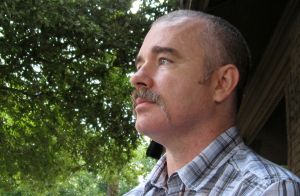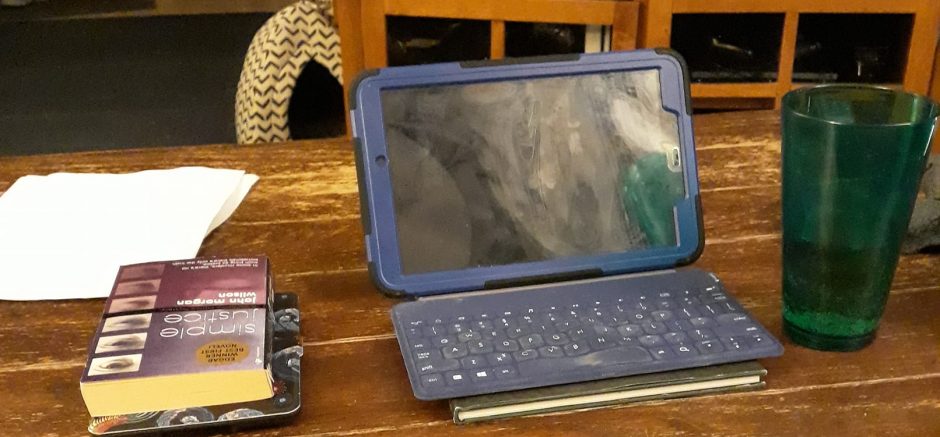Stalactites
In the cave, my friend J.C.,
Whose father wouldn’t claim him,
Broke stalactites with his fingers.
He caught a white cavefish, carried it
In cupped hands until clear water ran out,
Then bashed it bloody with a rock.
He pulled out the pack of Marlboros I’d lost.
He denied they were mine.
I said something about doing him like the fish.
He offered me food stamps, stolen from his mother.
She was at home, turning tricks for nothing.
She used the divorce money to buy a Monte Carlo.
She went to the honky-tonks—not city honky-tonks,
But roadhouses, where you find real trouble.
She brought men to the backseat of the car.
We lived in a trailer park.
Nothing is different there from anywhere else.
We knew what we were and we could laugh about it.
J.C. got a sleeveless pink t‑shirt from Wal-Mart.
The screen-print said “Innocent Man.”
He was guilty as hell.
Flood Season
The farmer gave up and swam around on his back in the corn tops,
Water whistling from tobacco-stained lips, fishes swimming in his eyes.
He saw me walking on his levee and he turned mean.
He swam at me with a single long stroke and grabbed me by the ankle.
The farmer opened his mouth and out came a roar—
No words per se, but it was clear he was Billy Goat Gruff-ing me.
I kicked him in the teeth then, and knocked his one gold tooth into the water.
I watched it sink down where the blades of the corn grass
Pirouetted like dancers in the floodwater; the gold tooth sank to the muddy bottom.
The farmer looked down, his mouth agape;
I kicked him again. One button popped off his overall straps.
I saw he had tits, with a hairy baby hanging in his chest hair, suckling
Tobacco juice. The baby looked up at me, a brown trickle on his chin.
I saw fish swimming in his eyes, so I kicked him, too.
The baby dropped down into the water, sinking like a rock, then spotted the gold tooth,
Gobbled it up like it was a worm wriggled off a hook,
Kicked his legs and shot away through the cornstalks, shimmering like a bluegill.
Then I looked and the farmer was floating back out into the water,
Laughing like mad as the corn tops tickled his uncovered breast.
The farmer thought about that baby having his gold tooth.
He reached down into the mud, pulled up a mussel and threw it,
Knocking out my last baby tooth.
He lifted his arms to swim at me again, but this time I ran.
My feet skipped like stones across the water.
I ran up the hill, through the pasture, across the train tracks and jumped a fence
Into the yard of the Methodist Church, where seven men sat in the shade
Eating a picnic lunch, on break from the railroad.
I saw they had the gold tooth on a stump, and the baby,
With river-bottom mud in its hair, clutching at it beside the Holy Bible.
One man said Hallelujah, are you an independent?
I didn’t know what he was getting at, so I said Hell no. I’m a Methodist.
Then I picked up the Holy Bible and I picked up the gold tooth.
I jumped onto the stump and pushed the gold tooth into my empty socket.
I read scripture out loud. The blood from my mouth ran onto the pages of the book,
While down in the cornfield the farmer swam
With sunfish in his moon white eyes.
(reprinted from Bad-Rotten, Pudding House Publications, and the Chiron Review)
Bad-rotten is an attitude, a ceiling, and a target for exploitation; it is the hopeless feeling a kid gets when he reaches for a reserve of strength not imparted to him. Nature, poverty and Jesus are the waypoints in these bad-rotten poems, which have previously appeared in publications such as The Potomac Review, The Chiron Review and Arkansas Literary Forum.
–Pudding House Publications.
 Michael Hoerman was born in Carthage, Missouri in 1968, a descendent of pioneers to the Missouri Ozarks. He was a 2004 poetry fellow of the Massachusetts Cultural Council selected by Naomi Ayala, Mary Gannon, Thomas Lux and Afaa Weaver.
Michael Hoerman was born in Carthage, Missouri in 1968, a descendent of pioneers to the Missouri Ozarks. He was a 2004 poetry fellow of the Massachusetts Cultural Council selected by Naomi Ayala, Mary Gannon, Thomas Lux and Afaa Weaver.





